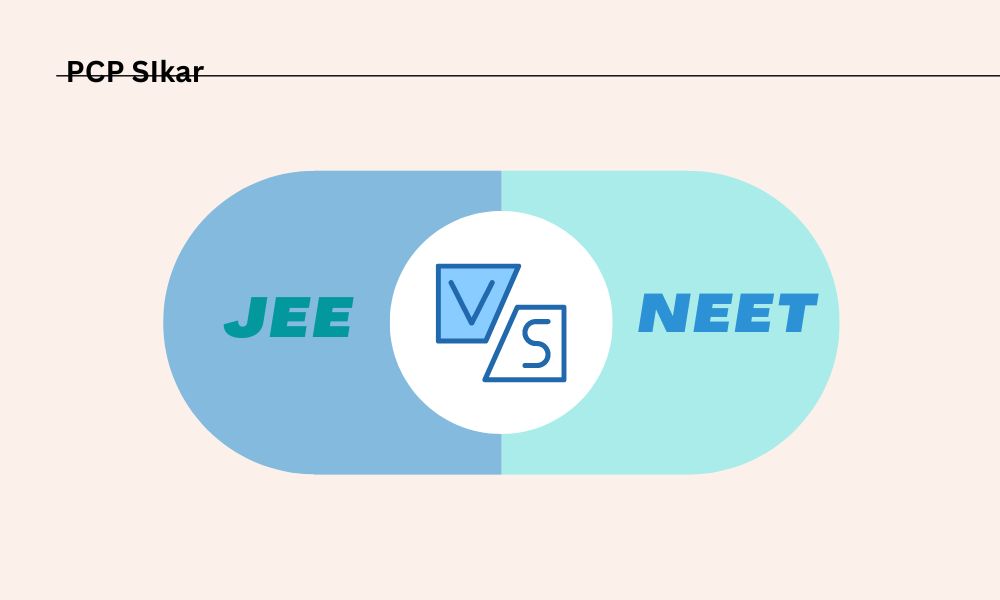
After class 10th, the biggest dilemma in students’ minds is whether to prepare for JEE or NEET. On the one hand, there is an opportunity to get a package of crores in the world’s top companies by studying engineering. On the other hand, there is a great option of becoming a doctor and researching the medical field. Both options are good, and many opportunities exist to pursue a career in both. But both are difficult and full of challenges. In this article, let us tell you about those factors so you can choose between JEE & NEET.
As JEE and NEET are based on different subjects and lead to different careers, it is important to know how to choose between JEE and NEET. Both exams allow you to get into well-known colleges, get respectable careers, and earn well for your future. But without knowing which path to go down, picking an exam might not go as smoothly as you think.
JEE and NEET are quite different from each other. While JEE tests your problem-solving capacity and analytical ability, NEET tests your concepts and the capacity to apply them. The most important role in choosing JEE and NEET is of your interest. If you like understanding machines and their mechanism and solving problems, then engineering is right for you after JEE. On the other hand, if you are interested in research in the medical field and know about diseases and the methods of curing them, you can prepare for NEET. Let us present a comparative description of the career and future of both options so that it helps you in choosing between JEE and NEET.
So, what do you need to know to choose between JEE and NEET? First things first, you should know about the two competitive exams. Both JEE and NEET are essential exams to get into most colleges, especially if you want to attend any medical or engineering college.
But just knowing about the two exams is not enough. You also need to know about the differences between the two exams. Additionally, knowing your own abilities and preferences will help you choose according to what you can and want to do in the future, allowing you to choose between JEE and NEET wisely.
Understanding JEE
Let’s come to the first main point. What is JEE? JEE, previously called IIT-JEE (Indian Institutes of Technology Joint Entrance Examination), is one of the most highly regarded exams in the country. It is one of the final obstacles to getting into some of the most respected and sought-after engineering colleges in India.
As an entrance exam for engineering colleges, JEE exam papers ask questions from Physics, Chemistry and Mathematics. You should also know that the exam is held in 2 phases. The first phase is JEE Mains, which allows you to enrol in NITs, IIITs, and other government engineering colleges. The second phase is JEE Advanced, where clearing the exam lands you a seat in the prestigious IITs. Meanwhile, JEE Mains has two sessions, the first in January and the second in April.
There are very limited seats in IITs, which makes it tough. Additionally, the number of applicants every year increases competition in JEE. However, overcoming this obstacle is highly worth it, as you get to enrol in an IIT and use the title of IITian.
The question papers themselves add to the difficulty of JEE. The exam papers are made by different IITs, which shows why clearing JEE Exams is a massive feat. Here, the results are not simple marks but a symbol of the student’s intellect.
Understanding NEET
What’s NEET? The National Eligibility cum Entrance Test (NEET) is a competitive entrance exam that has become essential for getting enrolled into some of the top medical colleges for courses in MBBS. Although the NTA holds NEET to allow students to enrol in prestigious medical and dental institutes like AIIMS, government colleges also consider its scores for courses like BPT, BDS, BAMS, and BHMS.
As the NEET exam is for medical courses, the subjects that NEET question papers focus on are Physics, Chemistry and Biology. The NTA conducts it only once a year, which makes the NEET exam more competitive.
Even if some prestigious colleges like IIT do not make the NEET question papers, they are still tricky, and you should make the most of your time to prepare for the exam.
PCP Sikar’s Devesh Joshi NEET AIR 1
Key Differences Between JEE and NEET

Now that you know the basics of both JEE and NEET, let’s explore their differences, which are crucial for understanding how to choose between JEE and NEET:
| Features | JEE | NEET |
| Exam Name | Joint Entrance Examination (JEE) | National Eligibility cum Entrance Test (NEET) |
| Conducted By | National Testing Agency (NTA) | National Testing Agency (NTA) |
| Stages | 2: JEE Main and JEE Advanced | 1 |
| Exam Mode | Computer-Based (Both Main and Advanced) | Pen-Paper Based |
| Frequency | Twice a year for JEE Main and once a year for JEE Advanced | Once a Year |
| Number of Attempts | Three times in consecutive years for JEE Mains, two consecutive times for JEE Advanced | As many times until the candidate reaches age 25 for Gen and age 30 for SC/ST/OB |
| Eligibility | 12th standard with Physics, Chemistry, and Mathematics | 12th standard with Physics, Chemistry, and Biology |
| Class 12th Score Requirement | General students must have 75% and Reserved 65% | General students must have 50%, OBC 45%, and other 40% |
| Subjects | Physics, Chemistry and Mathematics | Physics, Chemistry, and Biology (Zoology and Botany) |
| Courses Offered | Engineering, Architecture, and Planning courses | Medical and Dental Courses |
| Number of Seats | Approximately 17,385 seats in 23 IITs, 23954 in NITs, 7746 in IITs | Approximately 55,486 seats (govt), whereas the total seats are approx 1,15,000, as 7,000 MBBS seats increased this year. |
| Competition (no. of applicants) | High | Extremely High |
| Application Fee | Varies based on category and exam | Varies based on category |
| Important Exam Months | JEE Main: January & April, JEE Advanced: May | May (First Sunday of May) |
Guide to Help How to Choose Between JEE and NEET
Now that you know about the individual exams and their differences, it’s time to learn the factors that should affect your decision.
Many things can influence your decision to choose between NEET and JEE. Although your parent’s wishes should be considered, you should not fall for peer pressure and follow these points to decide between JEE and NEET:
1. Your Academic Interests
This point should be the most important of all. If you are interested in mathematics but are applying for NEET, that’s not your most intelligent decision. You should prepare and apply for the exam which aligns with your subject of interest, which is JEE.
If you like Biology and would love to learn more and work in the field, definitely pick NEET. Studying according to your academic interests will be much easier than going against what you like. Additionally, when you clear NEET, you will have many options for courses in the medical and dental fields.
The same goes for Mathematics and JEE. If you prefer maths, you should attempt JEE to get the chance to study a course that aligns with your interests. There are many options, so choose what you want and pick a career goal in that path. Speaking of Career Goals…
2. Your Career Goals
As you know now, NEET covers physics, chemistry and biology, emphasizing on life sciences. On the other hand, JEE covers physics, chemistry and mathematics, making the exam and related courses inclined towards engineering, mathematics and physical sciences.
So, if you wish to become a doctor—any kind of doctor (but not the psychologist kind)—NEET is your choice. You could become a surgeon, neurologist, dentist, or other doctor, depending on your specialisation.
On the other hand, if you plan to work towards one of many branches of engineering, or if you want to work in R&D for engineering and technology, then go for JEE instead. With access to courses like B.Tech, B.E. and B. Planning, you could choose a career in computer, electrical, mechanical, civil, or other fields according to your interests.
Think about where and how you want to be working in the future and what you love doing, and you will know which exam to choose between JEE and NEET.
3. Academic Ability
Let’s say you aren’t particularly interested or are equally interested in both of the two subjects. So which exam should you choose, JEE or NEET? How about we look at an example:
Let’s assume Student 1st does not know how to choose between JEE and NEET. He needs to know which subject he enjoys more or what he wants to do in the future. So how should he choose? Here, the best decision would be to choose an exam according to what you can do best.
If Student 1 does better in Mathematics, he should take the JEE. This is because he is better in Maths, and attempting the JEE will give him the opportunity to choose a future according to his academic ability.
The same goes for Biology and NEET. If a student does not know what to choose and finds biology easier to perform well in, then attempting NEET will allow him to choose his career path based on what he can do best.
Knowing what you’re good at is another major point that can help set you on the right career path. Whether it’s the ease of studying for a subject or which subject you can score more on. If you can’t decide on a preferred subject, use these facts and results to help make a choice.
Knowing your interests, what you want to be in the future, and your vital subjects will all help you to decide between NEET and JEE. Even if you get conflicted over the choice due to one point, the other two will help ensure you make the right decision.
Conclusion
How to choose between NEET and JEE? A simple but tricky question, as it is a choice between just two options, but this one choice can also decide your entire future. To make it easy for yourself, know your interests. Know what you want to be in the future. Know what your strengths are.
But remember that if you are unsure even after these points, ask your parents and teachers for help. They will help you choose between the two exams to choose a future path.
